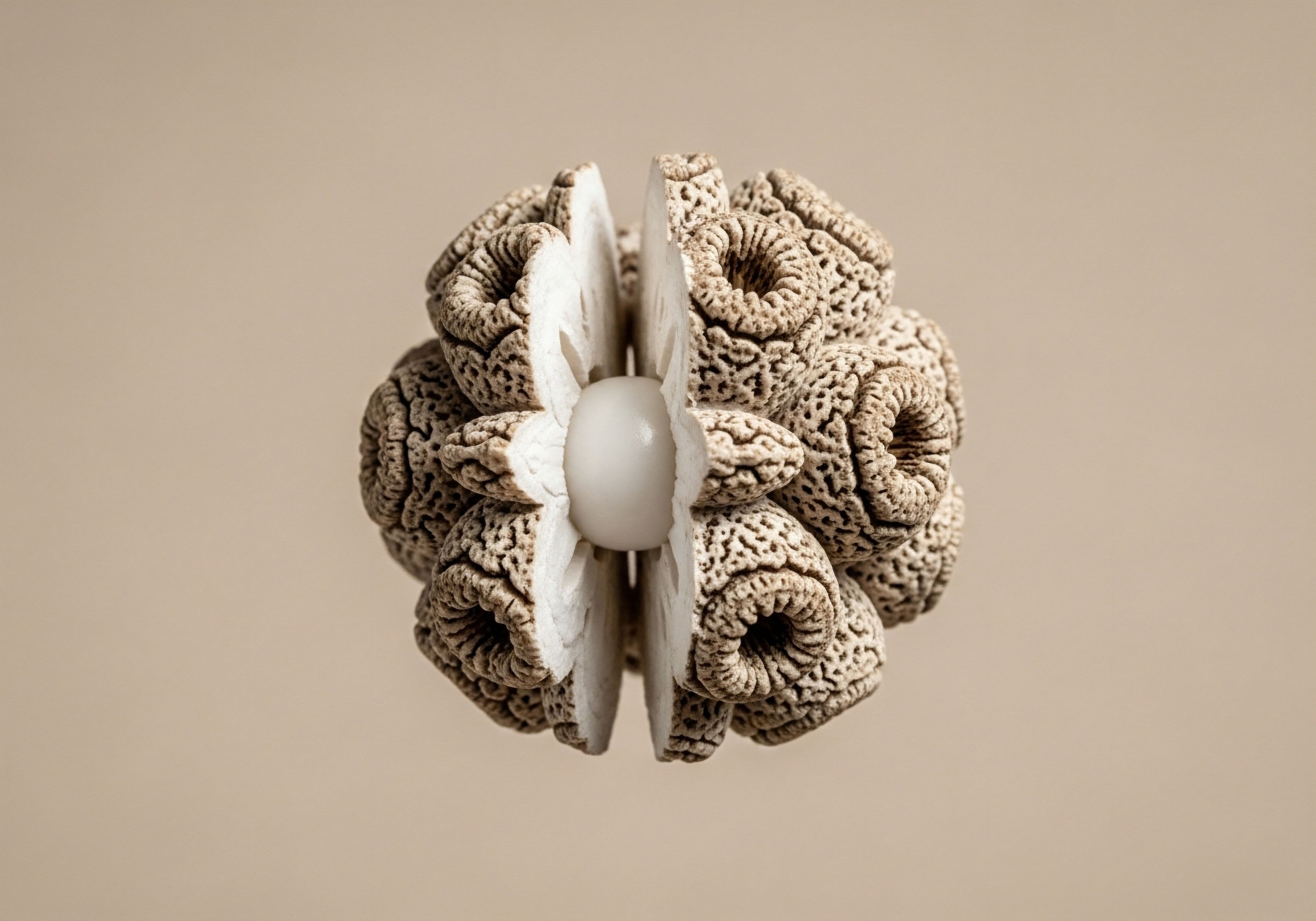

The Mind’s Chemical Architects
Your cognitive capacity ∞ the sharpness of your focus, the depth of your memory, the speed of your processing ∞ is not an immutable trait. It is a dynamic output, intricately governed by the complex biochemical symphony within your body.
At the core of this symphony are your hormones, powerful signaling molecules that act as master regulators, dictating everything from mood and motivation to the very architecture of your thought processes. Understanding their role is the first step toward reclaiming and amplifying your mental acuity.

The Symphony of Hormones and Mind
The brain is a high-demand organ, consuming a disproportionate amount of the body’s energy. This demand requires a sophisticated internal environment, one meticulously managed by hormonal signals. These signals do not merely influence broad states like energy levels; they precisely modulate neural circuits, synaptic plasticity, and neurotransmitter availability, all of which are fundamental to cognitive function.
When this hormonal ecosystem is in equilibrium, the mind operates with clarity and efficiency. When it is disrupted, the cognitive landscape can become clouded, performance degrades, and potential remains untapped.

Neurotransmitter Orchestration
Hormones act as key conductors for your neurotransmitters, the chemical messengers that transmit signals between neurons. For instance, testosterone plays a significant role in modulating dopamine and serotonin pathways, impacting executive functions such as planning, decision-making, and working memory.
Estrogen, particularly estradiol, influences the production and sensitivity of various neurotransmitter systems, including acetylcholine, which is critical for learning and memory formation. Thyroid hormones are essential for regulating the metabolic rate of brain cells, directly affecting the speed at which information is processed and transmitted. The delicate balance of these interactions determines the responsiveness and efficiency of your neural networks.

Mood and Motivation Matrix
Your subjective experience of mental well-being is profoundly linked to hormonal status. Imbalances in hormones like cortisol, testosterone, or estrogen can directly contribute to feelings of lethargy, anhedonia, or irritability, all of which erode mental drive and focus. Low testosterone, for example, is frequently associated with reduced motivation and a diminished sense of well-being.
Conversely, optimized hormonal profiles can bolster resilience to stress, enhance mood stability, and foster a robust sense of purpose and drive, creating fertile ground for sustained mental engagement and productivity.

Memory and Learning Architectures
The processes of encoding, consolidating, and retrieving memories are heavily influenced by hormonal milieu. Estrogen has been shown to support neurogenesis and synaptic plasticity in brain regions critical for memory, such as the hippocampus. Studies indicate that optimal estrogen levels correlate with enhanced verbal memory recall and learning capabilities.
Testosterone also contributes to spatial memory and the consolidation of new information. Thyroid hormones are indispensable for optimal brain metabolism, influencing the speed and accuracy of learning new tasks and retaining information. Disruptions in these hormonal signals can manifest as forgetfulness, difficulty concentrating, and a reduced capacity for acquiring new knowledge.


Tuning the Internal Engine for Precision
Achieving optimal hormonal balance for peak mental acuity is an active process of bio-engineering. It requires a systematic approach that addresses foundational lifestyle elements and, when necessary, employs targeted interventions. This is not about passive acceptance of age-related decline but about proactive engagement with your body’s operating system to unlock its highest potential.

Foundational Pillars of Optimization
Before considering advanced protocols, establishing a robust foundation through lifestyle is paramount. These elements work synergistically to support endocrine function and overall physiological resilience.

Metabolic Health and Hormonal Resonance
Your metabolic state is intrinsically linked to hormonal regulation. Insulin sensitivity, blood glucose control, and lipid profiles are not merely markers of metabolic health; they are indicators of systemic hormonal balance. Chronic inflammation, often a byproduct of poor metabolic control, can disrupt endocrine signaling and impair neural function. Optimizing metabolic health through balanced nutrition and regular physical activity creates an environment where hormones can signal effectively, supporting cognitive processes rather than hindering them.

Sleep ∞ The Circadian Master Switch
Sleep is the primary period for hormonal regulation, cellular repair, and cognitive consolidation. Inadequate or disrupted sleep directly impairs the hypothalamic-pituitary-adrenal (HPA) axis, leading to elevated cortisol and dysregulated other hormones. It also compromises the brain’s ability to clear metabolic waste products and consolidate memories. Prioritizing consistent, high-quality sleep ∞ aiming for 7-9 hours per night ∞ is non-negotiable for maintaining hormonal harmony and sharp mental function. This includes establishing a regular sleep schedule and optimizing your sleep environment.

Nutritional Bio-Tuning
The nutrients you consume serve as the building blocks and cofactors for hormone synthesis and function. A diet rich in healthy fats, lean proteins, and a wide spectrum of micronutrients supports endocrine health. Essential fatty acids, such as omega-3s, are critical components of neuronal membranes and influence neurotransmitter function.
Adequate intake of vitamins and minerals like zinc, magnesium, and B vitamins is necessary for enzymatic reactions involved in hormone production and metabolism. Focusing on whole, unprocessed foods provides the raw materials your body needs to maintain hormonal equilibrium and cognitive vitality.

Advanced Intervention Protocols
For individuals whose hormonal profiles present significant deviations from optimal ranges, or who seek to push performance boundaries, advanced interventions may be warranted. These protocols require careful assessment and professional guidance.

Hormone Replacement Therapy (HRT) and Optimization
Hormone replacement or optimization therapy involves supplementing or modulating hormone levels that have declined due to age, disease, or other factors. This can include testosterone therapy for men experiencing hypogonadism, or estrogen and progesterone therapy for women undergoing menopause.
These therapies, when administered under medical supervision, can restore physiological levels, directly addressing symptoms such as brain fog, reduced motivation, and impaired memory. The goal is not supra-physiological levels, but rather returning levels to a healthy, youthful physiological range that supports optimal brain function.
Clinical data indicates that optimizing testosterone levels in aging men can lead to significant improvements in cognitive domains including verbal fluency and spatial reasoning.

Peptide Signaling for Cellular Regeneration
Peptides are short chains of amino acids that act as signaling molecules within the body, influencing a vast array of physiological processes. Certain peptides, such as BPC-157, CJC-1295, or Ipamorelin, have demonstrated potential in supporting tissue repair, modulating growth hormone release, and reducing inflammation.
These actions can indirectly benefit cognitive function by improving overall systemic health, enhancing cellular repair mechanisms in the brain, and supporting neurogenesis. Their application is a sophisticated strategy for enhancing the body’s intrinsic repair and optimization capabilities.

Stress Resilience and Cortisol Management
Chronic stress elevates cortisol, a hormone that, while vital in acute situations, becomes detrimental to cognitive health with prolonged elevation. High cortisol levels can damage the hippocampus, impairing memory and learning, and contribute to anxiety and executive dysfunction. Strategies for managing cortisol include mindfulness practices, adaptogenic herbs, and targeted nutritional support. In cases of severe dysregulation, pharmacological interventions may be considered to restore HPA axis balance, thereby protecting cognitive architecture from the ravages of chronic stress.


The Rhythms of Optimization
Determining the appropriate time and strategy for hormonal intervention requires a precise understanding of individual physiology and the subtle cues your body provides. This is an ongoing calibration, not a one-time fix, demanding vigilance and data-driven decision-making.

Recognizing the Cues for Intervention
The decision to intervene in your hormonal landscape is guided by both objective biological data and subjective experiential feedback. Both provide essential pieces of the puzzle for diagnosing and addressing cognitive discord.

The Biomarker Spectrum
Objective assessment through laboratory testing is foundational. This includes comprehensive hormone panels measuring levels of testosterone, estrogen, progesterone, DHEA-S, thyroid hormones (TSH, Free T3, Free T4), and cortisol. Beyond hormones, evaluating metabolic markers like fasting glucose, HbA1c, and lipid profiles provides context for endocrine function. Tracking these biomarkers over time allows for the identification of trends and deviations from optimal physiological ranges, signaling when intervention might be most effective.

Subjective Experience as Data
Your lived experience is critical data. Persistent symptoms such as persistent brain fog, a noticeable decline in focus, diminished motivation, mood disturbances, or impaired memory recall are direct indicators that your internal chemistry may require adjustment. These subjective reports, when correlated with objective biomarker data, paint a complete picture of hormonal influence on mental acuity. Attending to these signals allows for timely and precise intervention.

Strategic Application of Protocols
Implementing hormonal strategies is an art informed by science, requiring a phased and personalized approach to achieve sustainable cognitive enhancement.

Phased Implementation
The journey toward hormonal harmony for mental acuity typically begins with foundational lifestyle adjustments ∞ optimizing sleep, nutrition, and exercise. If these measures do not yield sufficient results, a gradual introduction of targeted therapies may follow. This could start with specific micronutrient supplementation, move to adaptogens or mild hormonal precursors, and, if indicated by persistent deficiencies and symptoms, progress to more direct hormone replacement or peptide therapies. Each phase is monitored for efficacy and safety.

Long-Term Vitality Trajectories
The ultimate objective is not merely a temporary cognitive boost but the establishment of a sustainable state of high-level mental function and vitality throughout life. This requires ongoing monitoring, periodic reassessment of biomarkers, and adaptive adjustments to protocols as individual needs evolve. The goal is to maintain hormonal balance that supports not just immediate cognitive performance but also long-term brain health and resilience against age-related decline.

Mastering the Code of Your Cognition
The intricate interplay between your hormonal system and your cognitive capabilities presents a compelling opportunity for self-mastery. By understanding the biochemical architects that shape your mental landscape ∞ the hormones ∞ you gain the power to tune your internal engine for unprecedented clarity, focus, and performance.
This is not about chasing youth, but about engineering a future where your mind operates at its absolute peak, unburdened by biochemical limitations. It is a testament to the body’s capacity for optimization when approached with informed strategy and a commitment to understanding its fundamental operating principles. Your path to mental acuity is paved with the intelligent calibration of your endocrine system.

Glossary

mental acuity

cognitive function

hormonal balance

metabolic health

endocrine health

vitality

hpa axis




